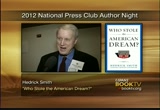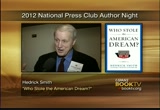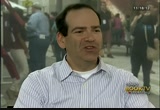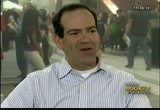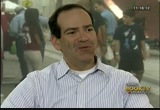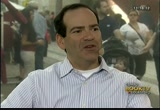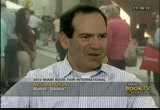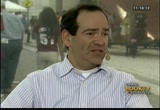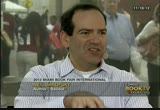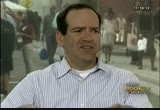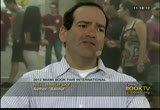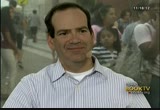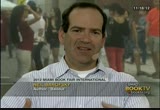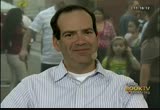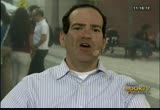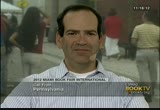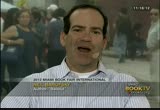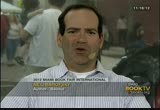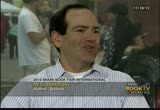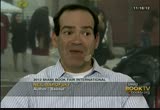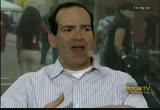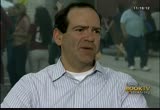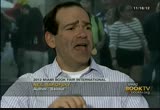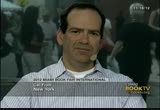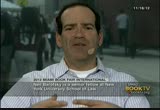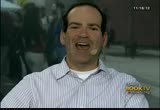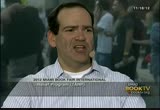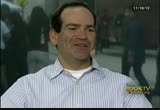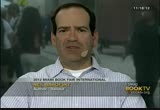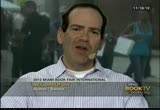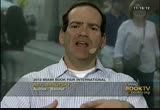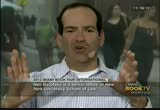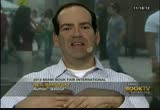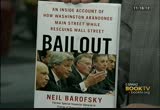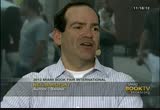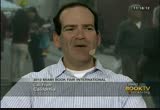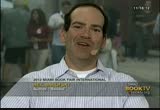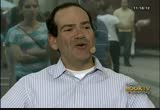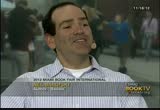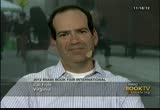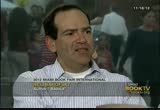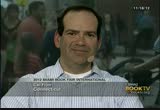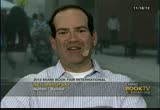tv Book TV CSPAN December 15, 2012 1:15pm-2:00pm EST
1:15 pm
it turns out the main people would get hurt by sub prime or prime borrowers. the same kind of patterns that i had seen in job of shoring, the burden ship on retirement. when a minute. there is a real story here about the american middle-class. actually my did not start with the title. i started with the titles, the dream at risk. i knew that there was a problem. everybody knew there was a problem. it was only as i get into it and kept discovering more and more things that i realized, this was not impersonal market forces. this was not technology. this was not globalization or what is happening with american politics and american economics, working against no class. people did this. we decided this. like other countries like germany, the middle-class is in better shape. better trading against the world, companies are making money. a lot of things that we heard that were not possible in america are actually happening in germany, and their wages have
1:16 pm
gone up five times faster than ours. there is something wrong inside the american political and economic system. that is what this book is about. >> hendricks mitt is the author. thank you for being an book tv. >> and now bailout, an inside account of how washington abandoned mainstream while rescuing longstreet. he argues that the $700 billion troubled asset relief program or t.a.r.p. program was mishandled. about 40 minutes. >> joining as now his kneele brodsky, a former inspector general for tart -- t.a.r.p. you saw him earlier on a panel. here's the cover of his best seller called "bailout." how did you become the inspector general? >> it is kind of a strange
1:17 pm
thing, especially for me. i was a federal prosecutor up in the southern district of new york. i spent the years leading into the financial crisis during securities fraud cases and earlier in 2008i started the mortgage fraud group that was targeting, you know, those types of cases that really helped lead to the financial crisis, major fraud in the mortgage finance system. so after the t.a.r.p. bill was passed, congress enacted this marble piece of legislation, they included within this new agency called the office of the specialized sector general for the trouble as a relief program. this incredibly great, you know, washington is the city of acronyms, and hours. the call went out to the different offices around the country looking for someone who had experience in mortgage fraud and securities fraud. i had that experience, so i was nominated by my boss who was the u.s. attorney, and it was sort of this crazy world wind of six weeks from when he had that conversation with me when i was
1:18 pm
actually confirmed and started serving as the special inspector general. >> was the date that you started? >> december 15th, 2008. >> what are your politics? nominated by the bush administration essentially, but what are your politics? >> i have been a lifelong democrat. since i was old enough to vote, i have always been a registered democrat. it is kind of funny. when the u.s. attorney approached me and asked if i was interested that john and i was sort of going through different excuses why i did not want to go to washington. very happy with being a prosecutor. the only job i ever won it. was getting married, but finally when all those arguments that failed i sort of said in a very dramatic way, by the way, you know that i am, in fact, a registered democrat. it kind of went die and that that i have the killer. and i entreated to barack obama just two weeks ago to his campaign. but it was not a political appointment, it was a merit appointment. think they just thought i had the right experience to protect
1:19 pm
this giant bailout from criminal fraud, think that's why i get the job. >> neil barofsky, when you look back at the legislation itself, not how it was administered, but when you look at the legislation , where some of the flaws in it in your view? >> i think that often what often erstandable given, you know, the sense of emergency, that this was a hastily crafted bill, but paul lot of policy goals in the bill, but it did not have the mechanisms, it did not mandate serpent -- certain mechanisms to carry out those policies. for example, the idea was that it was going to help expand the economy and, you know, money was not just going to the banks, it was going to get to the banks for the prompt -- for broader economic recovery, but a carry tremendous amount of discretion to the treasury department to carry out those policies and ultimately allow the policies that were adopted to be disconnected, you know, the program goes with the actual how
1:20 pm
the program performed, so we had a housing initiative that was supposed to help 4 million people but only in the pumping about 800 something thousand out of that goal, and i think that, you know, a lot of times too much discretion was given to treasury, and that led to too few strings being attached to the money and not really execution all that well. achieving some of the more important means trickles of the program. >> 202 is the area code. you can see the numbers upon your screen. if you would like to participate in our conversation with neil barofsky. 585-3885 if you live in the east and central time zones. 585-3886 if you live in a mountain or pacific time zones. you worked with treasury secretary for about a month to month and a half or so and then with tim geithner, of course, over the years. so was your relationship? >> guest: well, with secretary paulson, it was a much shorter route of time, but i found him very candid with us and very
1:21 pm
accommodating. it was, he swore me into office. i sat in his office, but my hand on the pulse and family bible into a field the ball this. almost immediately from the beginning he was -- he really wanted to hear where i've is coming from, where my office as coming from, wanted our input asking about the auto bailout and what types of protections we thought would be necessary to protect the program for prod. now, with his treasury department we had some serious attention as we were pushing for more transparency and more conditions. they were certainly pushing back, but personally, i did find that he was interested in a we had to say. as one of his chief lieutenant said, he wanted to make this work. our relationship with secretary geithner was different. it was -- he was pretty much dismissed from kaywun. he was not really terribly interested in hearing from me are hearing from our office are working with our office. over the course of two plus years i had to 1-1-1 meetings
1:22 pm
with them. that was said. mom was about 30 seconds and the other was a logger affair or a letter the cursed me out for suggesting that he was anything other than sufficiently transparent. the language, i will use the actual language, but on the most transparent secretary of the treasury in the history of this country and really could not believe that i was suggesting otherwise. and i think the other thing with geithner is that there was a lot more nastiness behind the scenes, you know, leaks of false information to the press the came out of his treasury department and a lot of, you know, dirty washington political tricks. think there were directed toward us. i don't know if he was personally responsible for that, but under his treasure department we saw a lot more of that under-secretary geithner then we get the paulsen. >> host: what grade would you give the administration with t.a.r.p.? >> guest: it has to be in half. it really does. a lot of people we will say, well, hey, it helps save the financial system. we did not have a bigger financial crisis, and that is true.
1:23 pm
the program deserve some credit for that, but ultimately the program was not just about saving the financial system for the sake of saving the financial system. it was to spur a broader economic recovery, to preserve home ownership by keeping people in their homes, as we were told, the money was going to go to the banks, but the ploy, not toward it, so it would go into the economy and increase lending so there would be less misery to run the country, and none of that happened. so i think there was -- it was helpful in preserving the status quo. it did not achieve those major policy goals, and even with that status quo, what did we really save? a broken system of too big to fail banks. through c-span.org we made an even bigger, more dangerous, and in many ways today we are still on a path to potentially another french a crisis because of the decisions that were made back in 2009. >> host: before we get started and go to calls, of your watch by here and saw the book and said, make sure to ask him about
1:24 pm
the fiscal cliff. whether or not you have an opinion, whether or not you have some knowledge. would you like to say? >> guest: you know, i think the fiscal cliff is a great neck in, but i think it sort of creates the sense of emergency that if nothing happens by january 1st the entire economy is going to crater into the next great depression, and i think that is not really what's going to happen. there is some degree of time before this combination of tax increases and spending cuts. my general feeling in the fiscal cliff is that we don't -- this is sort of a man-made crisis. i don't think that we have this crushing budget issue that has to be dealt with at this precise moment or the world will end. i think that we are still in a very anemic recovery in there are a lot of people really startling out there across the country and that our priority should be strengthening our safety net during times of economic dress. now is not the time. in my opinion the commit to be contemplating significant cuts in things that a lot of
1:25 pm
struggling working class people who have lost grip of the middle-class, a lot of potential spending cuts that are talked about can really have a negative impact on people and a time when they needed the most. i am much more concerned about increasing poverty rates, about protecting the long-term unemployed, not necessarily worry about whether it's another three or six or nine months before we deal with the overall issues, but what i think will happen, there will do what they always do, kick the can down the road, send it out for three, six, nine months and then we will have another fiscal glove. >> host: did economic policies in your view, lead to 2008? did federal economic policy lead to that? >> at the broad deregulation. we had a banking system that was boring. boring banking in this country that existed from the ashes of the great depression. wonderful regulatory reforms that we had under fdr, and they protected their financial system
1:26 pm
for decades upon decades upon decades. then you saw, you know, through the end of the clinton administration, this sort of dismantling of a lot of those projections, and you saw, as a result, an increase in concentrated risk in the financial sector in this explosion of these monsters, these frankenstein monster banks that have -- that are so big that the failure of any one of which has been deemed to bring down the entire freight system. we saw this enormous crisis, so i do think that washington has played a role through deregulation and then also, just bad regulation. by being too overly differential to the interest of the big banks , the financial institutions, looking yet await that some really egregious misconduct that led up to the crisis that helped create this china has in bubble that exploded so painfully. so i think the regulators to certainly share the burden of blame along with the financial restitutions themselves. >> host: "bailout" by neil
1:27 pm
barofsky is a best-seller. the first call is patricia in cottonwood, california. patricia, you're on book tv. go ahead with your question or comment for neil barofsky. >> caller: yes. hi. i just wanted thank you for writing this book because has opened my eyes to exactly what happened. i remember when they were voting on this, and i was kind of screening of the tv, please don't do this. your book has made it able for me to understand how on-line level, i guess, i could say, exactly what happened, and i just thank you so much for writing this book. al was wondering if you are going to write any other books about the stimulus or anything else, you know, these big huge things that they are passing. there is anything like the ordinarily person can do to get there voice heard. >> guest: first of all, thank you. it feels great, you know, when writing a book like this.
1:28 pm
it is a challenge writing about the bailout, and one of the things that i try to do was to make it accessible and understandable. and when i had a job in washington, special inspector general, that was always part of our mantra. i used to talk it talk -- call it talk 101. they can really understand what was going on. so it feels particularly good to hear there really kind comments that you just said. as far as the next book, i'm still sort of recovering from this book. as a first-time author i enjoy the process, and i really -- it was something that was -- you know, you never know when you go on a venture our journey like trying to produce a book what it will be like. them interested in producing something else. the existence in the topic of want to sit -- sink my teeth into. >> host: next call for neil barofsky comes from travis and orlando, florida.
1:29 pm
hi, travis. >> caller: high. yes. i was wondering how much of t.a.r.p. has been paid back. of that money, how much to the ceos? thank you. >> guest: so, you know, i'm not sure the precise number. at the last time i checked it was maybe $100 billion that was outstanding, but it may be less now be you can go on to our old website much of recorder we keep the updated numbers. but a lot of money went to the ceos is the answer to your question. you know, 2010 was a banner year for wall street as far as bonus payments. a lot of the big banks were out of t.a.r.p. by then. even throughout 20009 na, there were some restrictions in the t.a.r.p. legislation, but it really did not impact the ceos that much. they continue to have very significant salaries. one of the things i read about in the book is out there was this real push within treasury,
1:30 pm
the acceptance of giving a huge amount of bonuses to the executives of the algae which was, of course, the biggest bailout recipient. millions of millions of dollars going to some of the executives at the very heart of aig that ended up destroying the company. it is a constant source of funds rate -- frustration, the fact that our money was being directed with treasury consent into the pockets and the very people who caused this crisis and then eventually benefited so generously from the terms that there were delivered as part of the bailout. >> host: irene into our town, pennsylvania. hi. >> caller: hello. thank you so much for clearly articulating your comments about the fiscal cliff and will we need to be investing. i appreciate that. i was most interested in your process for writing the book. so close to the event that you have to get special permission to write the event. something you felt strong about. what was your primary motivation
1:31 pm
since some many innocent looking for better jobs are any jobs, i was also interested. he said he left a job you love to do this. he said you might read something else. clearly maybe you didn't love this job because of the frustrations, but what you going to do next. process, permissions, and next steps. >> guest: short. so, you know, the good news about this is that for me when writing this book, there are certain things i could never write about. for example, a type of ongoing criminal investigation, and any of that information was just completely out of bounds for me. there are all sorts of, you know, grand jury concerns and confidential criminal investigations. so when i wrote this book, what i decided to do was instead of doing anything that would require me to seek permission to my staff to topics and issues that i knew where it -- can no were even close to infringing any type of privileges, whether criminal law or banking supervision privileges and all sorts of privileges that as an office move required to be under, but i really can't things
1:32 pm
to areas where there would be no hint or suggestion. and did not want to have to run my but by the treasury department. in any way, shape or form. obvious they're not going to be happy about it. there were not happy about the hard treason had tried to deliver in this book. it really wasn't -- i really did not do anything or go into any of those areas. sometimes it was a little frustrating. things that i would have liked to explored it, but i thought it was safer and easier to come nowhere close to that line, and i felt like i could tell the story without having to ask go there. and as far as next steps, right now i'm teaching at nyu school of law, which i am enjoying and loving. there were so supportive of the process. in a not really sure what's next. but it has been a crazy, wonderful right. and even though i had a hard time in washington in a lot of respect seven never give back a second of it. i'm beginning to serve the country in the way that i got to
1:33 pm
so blessed and fortunate. getting to work and serve the amazing men and women got to work with. it really is. i don't think i'll ever have a professional moment like i did. i don't regret or would not take back a second. >> host: .. kahlo was your professional relationship with now senator elected elizabeth warren back in your t.a.r.p. days? >> i love hearing those words from senator alike to elizabeth warren. the head of another oversight created in the same bill that created t.a.r.p., the congressional oversight panel. she was the chair of that panel. we had parallel relationships. my focus was different because i was inside the treasury department. i have access to all that information. access, and all of their privileges and had a law enforcement function. we were in executive-branch agency. there were a creature of congress and did broader policy tight oversight. she brought her academic credentials, and that type of
1:34 pm
analysis. so we worked together. we did on joint projects together, and i get to know her. it was one of the most delightful things are going to washington the, i write about some of the lens is i had. we would compare notes about the different frustrations that we had. but i found her to be one of the most principled, admiral people and i get to meet in washington, and i just have nuys respect for her. one of the incidents to talk about in the book is that while she was pitching and advocating for the creation of a consumer financial protection bureau, no secret in washington that she was campaigning to be its first director. it was very clear that treasury secretary tim the gander was going to have input into decision. the bureau was originally going to be within the treasury department. i remember watching her do one for hearings and the congressional oversight panel with a dagger as a witness. she could have pulled punches. she could have taken it easy on him, and she didn't. she went after him.
1:35 pm
she is a gifted? cross-examined him and did not -- made in answer questions. really masterful performance, but incredibly not her own self-interest. aaron self-interest would have been to pull the punches and get the job, but she just wasn't that person. she was going to do the right thing over what might have been the easier thing with the best thing for her. so and from the she is going to be a senator, and that the issue will do a terrific job of holding the political parties accountable for their difference to wall street and be a real force in the middle-class. >> host: what was your relationship with the hundred 11th congress in 2009-thin? >> they were our best friend in many respects. congress has a terrible reputation. a lot of the release now well deserved, but for us because we were an oversight agency, and that naturally was going to put as in conflict with the treasury department and ultimately with the white house itself, we needed it to find allies. our strongest ally was certain
1:36 pm
members in the house of representatives and senate, and i would say republicans and democrats. we really enjoyed strong bipartisan support, and we would have had zero and back without them because very early on treasury, again, this was under bush, but then again, under obama, clear that there were not going to necessarily take us all that seriously. we were not going to be followed but that changed once rebel to get some allies in congress, some oversight minded senators and members of the house representatives to start using the press and putting external pressure on treasury. that is what they responded to. so we had a pretty good relationship, and i have a lot of respect to my relief for members of both sides of the aisle who were supportive of us. i think a little bit more so even of the democrats as the obama administration to cold because often they would be taking positions and supporting us on oversight issues that put them in conflict with the democratic president.
1:37 pm
again, i think the principles were there the standing of the taxpayer against the power of the banks. so we had a pretty relationship with congress. >> to dodd-frank rain in some of the excess is that you saw? >> some of the excess is. there are some good things. the consumer financial protection bureau, which i think it is a very good addition. i think there are some improvements to the way that we approach the banks. so that is on the give ledger. ultimately, though, i think dodd-frank failed what it was supposed to do, which is end the era of bank bailouts in the era of too big to fail. there was an opportunity, really, for it to be effective. there was a bill that was pending in the senate that actually had bipartisan support. it seems almost crazy to say those words these days. a major bill had bipartisan support to break up the banks. and it had -- it ultimately got about thirtysomething votes, but it got killed by the treasury
1:38 pm
department and by the white house. they lobbied against it. the campaign against it. afterwards, the even told the media that this bill would have succeeded if they had been behind it, but there weren't. as a result we did not break up the banks. the banks are now 20-25% larger than it or before the crisis. and just as dangerous. by failing to take those steps, in many ways to help cement the status quo of too big to fail. >> guest: carl, bailout an inside account of how washington abandoned main street while rescuing law street. karl in yonkers new york. you're on with the author, neil barofsky. >> caller: does the sec, the elastic enforcement capabilities that the federal government has in doubt it with create an immediate limitation on what any regulator can create in terms of
1:39 pm
a permanent, long reaching enforcement agency. and has wall street, because of that, benefited and exploited it to a point where, perhaps, no single entity, whether the courts or congress can alter the means in which the sec operates under the guise of it? could you comment on that? >> guest: well, you are touching on a -- a really broad issue of the lack of accountability that has arisen out of this financial crisis. the we have seen some actions from the sec just this week against some of the banks themselves, we have not seen a degree of individual accountability either through the civil auspices of the sec or criminal action to the department of justice. can take your point there is a good one. that sends a really strong message of the exact opposite of
1:40 pm
what you want to have in the justice system, which is deterrence. the message is that for those executives and those individuals who broke off, who pushed the envelope, who did so for financial reasons, for profit and learned and enjoyed as nasa bonuses going into the financial crisis, the fact that they get to keep all that money and have not been held accountable, whether civilly or criminally, sends a message that, you know what, keep pushing the envelope, keep doing what everyone because you're going to get to keep your money without the fear of the justice system coming in and holding you accountable. and i would say it is partly that and part of the reality that with these giant banks that we put so much effort and so much treasure to rescue because of the fear that the failure of any one of them would bring down the entire economy that made them too big to fail, those same reasons, i think, play a part in the fact that it makes them almost immune to prosecution.
1:41 pm
we can no more in-depth goldman or j.p. and risk-taking in down in the economy down with them it is just not a realistic thing. too big to fail in 2008. they became too big to jail in 2009. i think the path would require us to break these banks up into little pieces so that we can go after them without having to worry about broader societal impacts by triggering one of their failures. >> host: about 15 minutes left with our guest, neil barofsky. "bailout" is the name of the buck. we have a tweet. have you ever feared for your life to this book? >> guest: i did, when i was in narcotics prosecutor i was the subject of a kidnapping and assassination attempt down in columbia. and i write about it in the book. it really was a stroke of just great on luck. we were investigating the
1:42 pm
revolutionary armed forces of colombia, a huge market terrorist organization, and they have infiltrated our investigation, sent a double agent, if you will, into -- with a plan to bring immolation and to call on the location of the yeltsin in place with their witness interviews, i tried to kidnap or murder me. and pure happenstance, we were able to avoid that, but that is probably the scariest thing as far as really having my life in danger. nothing in washington, as annoying and frustrating in her plan as it is ever came close to that. certainly nothing in washington as ever, you know, they may have tried to turn my career and my financial abilities in my reputation, certainly subject to those attacks, but nothing like that. so that is kid news. >> host: citizen of the world, sawyer interviewed by brian lamb. great insight. you take the sec position the past?
1:43 pm
>> guest: of course. i am not holding my breath. simon johnson was kind enough to suggest that i would be a worthy successor to mary schapiro, but, you know, i have done public-service. my greatest professional life was serving the government. if i was ever asked to serve again that position or act on it could really have a strong impact for positive change, i would do it in a heartbeat. with that said, and while i appreciate, greatly appreciate the suggestion and others to china and on behalf of this, i don't think it is incredibly lightly and will begin to nod. if asked, of course i would serve again. >> host: good afternoon. >> caller: thank you so much for taking my call. i would like you to name names. who are these criminals and how can we get them into prison?
1:44 pm
>> guest: well, unfortunately, we are running at a time. there is a five-year statute of limitations for most of the activity that would have led up to the financial crisis, so it is now late 2012, which means that anything, any criminal conduct that occurred before november 2007 is now barred by the statute of limitations. i think that fortunately we have run and the time to bring those types of cases. now, of course i can't say this person is a colonel and dispersed as a criminal. and get sued for that because ultimately the department of justice has decided not to pursue those cases, but when you look at some of the investigations, the information that came on the investigations, it certainly suggests that a high-level culpability, for a number of the executives at countrywide, aig, the fact that certainly suggested fraudulent intent, but ultimately decided not to pursue those cases as
1:45 pm
criminal cases and for a lot of them unfortunately that page is turned. in what is a very unsatisfactory ending. >> host: charles, lori, california. and afternoon tea. >> caller: a wonderful, wonderful book. very compelling. my question is, i heard an interview with president obama talk about the facts that it really >> host: charles, california. would not have helped in this situation because companies that acted a little different than companies, you know, like coleman, investment banks. can you explain a little bit about the prevention of these problems? and now you have gained a lot of financial education since he started. can you explain a little bit about how that work. >> sure. glass stiegel was the
1:46 pm
depression-era law that separated investment banks from commercial banks. so it put a -- it meant that, well, you know, basically a bank like chase could not also do investment banking activities and also in other areas like insurance. that bill really got dismantle by a series of regulatory decisions by the fed meeting of to the very end of the clinton administration where the last vestiges were basically voted or removed, torn apart by legislation. what president obama is referring to, and he is accurate, some of the biggest collapses and failures of the financial crisis did not happen from commercial banks that also an investment banks. it was either pure in best to have investment banking or insurance company. in this popular thing that is done by those, particularly those in wall street you want to keep the status quo of too big to fail going. well, that didn't cause the
1:47 pm
financial crisis, their for those of you who advocate for turning back to that law, well, you are all full of it and it is not necessary. i happen to differ. you look at a bank which clearly suffer enormous losses, and the only reason it did not fail because we belly out over and over and over again. something like a glass sigell would have kept an institution like that smaller and maybe not as much exposure as a did. what was essentially underwriting activity in securitization and getting exposure to real estate. i think the other part of that become even if you do believe and say, okay, i think it would not have prevented the last financial crisis, that does not mean that having -- bringing back regulation that could help minimize the impact or like the head of another financial crisis is an off-again idea. i think that, you know, it's not
1:48 pm
just me but people like the vice chairman of the ftse, no. of the federal reserve presidents. a number of leading academics and regulators to recognize that we do need to go back to some of those depression-era laws that will protect our financial system for the next crisis. i think the severity of this crisis, i direct result of having these jumbo financial institutions that were unable by tearing down glass still. >> host: neil barofsky, do we need to worry about this on an international level as well? >> guest: absolutely. for a number of different reasons. one of them is that these banks and international banks. to call it a u.s. bank, it might be based here, but this is -- very international organizations, and what we saw
1:49 pm
back in september of 2008, one of the reasons why it was so devastating was because of its international presence and the inability of u.s. regulators to wind down or go through chapter 11 bankruptcy judge to the u.s. legal system. they are everywhere. thousands and thousands of subsidiaries. to challenge is internationally. one is in any type of resolution regime or dealing with it when one of these gets into trouble has to be based on a really broad coordinated international response. secondly him because of the international nature of contagion to my problem, a crisis in europe, this ongoing crisis in europe, could have a significant impact that could very easily send us back. so this last financial crisis, u.s. on ground. we could take all the credit for it here, but that does not mean that the next crisis can start elsewhere. the history of financial crisis, that would not be the first time trouble in the 1990's coming of
1:50 pm
asia, russia. so we have double the ability to international shock that could bring the crisis on him even if we are in export of that part of the financial crisis. >> host: thank you for holding you're on book tv on c-span2. >> caller: are you uremia okay? >> host: we are listening. please go ahead, sir. >> caller: first off, i just realized i got neal's but from the library. i was on hold for six weeks. it's a popular book. my question as to why he mentioned that he is a democrat. his high level, i wonder how the place. is it important? as he does his work, is it on his forehead, oh, he is a democrat. what geithner deferred to him as opposed to republican? how does that play at that very
1:51 pm
high level of politics? >> guest: i would say that the only time a really benefited me in any way, shape or form was during the confirmation process. the fact that george w. bush had nominated a democrat for this gem sort of gave me a level of credibility that i was not -- for a person died would be a political guy, was the prosecutor. on the debt would have gone to the democratically controlled senate. very helpful for them to see me as a democrat. that this wasn't too, wasn't a political triumph consistent prosecutor. once the administration turned over and under the obama administration i think there was a great deal of frustration with me. i was viewed as a turncoat, a trader for having been so critical of the obama administration has a democrat. and a lot -- some much of washington is politics. one of my favorite rumors that the spread was that i was actually going to switch parties
1:52 pm
and become a republican can run for office as a republican. this is one of their rumors. the press would say we have the treasury. you have to put politics. early on in with something that mr. lewis. he sort of say, hey, i'm a democrat. i contributed to president obama pier rihanna i feel about putting an airport that i know is going to hit them right between the gas. the answer to that question is i took an oath of office. i put my hand on the family bible and swore to uphold the job that i would do. and that had a control. we had to put those issues behind us and do the job that we were sent to washington to do. >> host: did you meet with president george w. bush or
1:53 pm
barack obama? >> guest: arm sari. >> host: did you meet with george w. bush or barack obama? >> guest: nighter one. we always wanted to five nsa we because i went down with my deputy. it was really great to have in there. we really wanted to meet obama. that would have been really exciting. we thought we had a shot because senator mitch asked to put a bill through called a special one specter general act of 2009, and it was a great bill. one of my staff used to work at the white house and said to know what we see if we can get you over for the signing of the bill. this is terrific. regard to meet the president. we heard word back that they are not having a signing ceremony. the bill passed through congress, not a single dissenting vote. okay. oh well. a later i was in the senator's office thinking her for the bill under support.
1:54 pm
she said, it's a funny story and pointed to her staff. we get to meet the president. how is that? we had this lovely signing ceremony at the white house. she gets a meeting. the president talked to her, congratulated on the bill. i was like amount. until this incorrectly or maybe they lied to us. so i never got that moment. >> host: time for two more calls. >> caller: thank you for taking my call. thank you for being someone of integrity. i am wondering about the externalities'. the army ammunition plant in southwestern virginia is violating federal law, the plant is author to have operated by be which in 2010 received one of the largest fines and history from the department of justice
1:55 pm
for falsifying records. chairman of the board, and as the new york times reported in august, the united states accounts for 78 percent of the weapons sold worldwide, so the money has clearly taken over. there -- this emission plan is to be investigated for the toxins they're putting out and a lack of oversight from epa and our elected officials. >> host: thank you. if you could draw the larger lesson of money and in politics and policy. >> guest: this is one of the things i really was shocked to find out. just how much control and power the money interest of wall street had in washington. republicans and democrats and never seemed to make much difference. part of that, of course, the incredible roll the money place in politics through campaign contributions, the relentless lobbying.
1:56 pm
also, through placing people through the revolving door and having so many senior banking officials having decisionmaking power of high-level jobs in treasury and the regulators and the ideology that they bring with them really does have a level of control. what i saw close and personal was out in many ways the financial interest dictated the terms of the very on bailout. it's one of the reasons why you saw, so successful for the banks, so successful for wall street. such a failure on behalf of what it was supposed to do for main street in part because of the combination of deference and power that all came together that i saw and wrote about. >> host: last call comes from bill in redding connecticut. heine. >> caller: hello. ron paul has called for the federal reserve to be shut down.
1:57 pm
one interesting reason i thought is that he wants to bring money back to congress whereby they can do so without charging interest to itself. this is where it was done prior to 1913. it was also something that thomas jefferson and andrew jackson warned about, having these big banks take over the creation of harmony. it basically creates the money in charging interest on money that they create and of nothing to begin with. that's my question. >> guest: you know, so i have not really been focusing on money. it was really outside the four corners of my job. but what i would do is recommend to just about anyone if i could plug in the book, i'm just reading white house. i actually think that they really do a wonderful historical accounts of what you're talking
1:58 pm
about and how it applies today, so i would just refer to them because they have higher degree of expertise and i do in that area. to say it's a wonderful book. >> host: here is neil barofsky best seller, bailout, an inside account of how washington abandoned main street and rescued wall street. he has been our guest here on book tv. >> is there and not fiction author of books would like to see featured on book tv to max and this and e-mail. tweet us. he twitter.com/booktv with a month left to many publications are putting together their year-end list of notable books. book tv will feature several of these books. these nonfiction titles were included in mislaid magazine's staff picks for best books of 2012.
116 Views
IN COLLECTIONS
CSPAN2 Television Archive
Television Archive  Television Archive News Search Service
Television Archive News Search Service 
Uploaded by TV Archive on

 Live Music Archive
Live Music Archive Librivox Free Audio
Librivox Free Audio Metropolitan Museum
Metropolitan Museum Cleveland Museum of Art
Cleveland Museum of Art Internet Arcade
Internet Arcade Console Living Room
Console Living Room Books to Borrow
Books to Borrow Open Library
Open Library TV News
TV News Understanding 9/11
Understanding 9/11